The Economics and Statistics Division maintains archives of previous publications for accountability purposes, but makes no updates to keep these documents current with the latest data revisions from Statistics Canada. As a result, information in older documents may not be accurate. Please exercise caution when referring to older documents. For the latest information and historical data, please contact the individual listed to the right.
<--- Return to Archive
For additional information relating to this article, please contact:
November 24, 2022EMPLOYMENT, EARNINGS AND HOURS, SEPTEMBER 2022 Payroll employment
Nova Scotia had 441,137 payroll employees in September 2022, up 0.7% (+3,079) compared to August 2022, and up 5.0% (+20,837) compared to September 2021.
Canada had 17.7 million employees, an increase of 0.5% (+85,331) compared to last month and up 5.4% (+904,086) compared to a year ago. The largest payroll employment increase compared to last month was observed in Quebec (+1.0%). Newfoundland and Labrador (-0.4%) posted the only monthly decline in September.

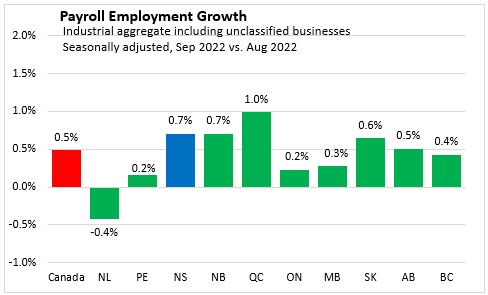
YEAR-TO-DATE (Jan-Sep 2022 vs. Jan-Sep 2021)
In January-September 2022, Nova Scotia's payroll employment increased 4.8% over January-September 2021. Nationally, payroll employment rose 7.0% in January-September 2022, with all provinces reporting increases. The largest payroll employment increases were observed in Ontario and British Columbia (both +7.8%). The slowest payroll employment growth was observed in Newfoundland and Labrador (+3.8%) and New Brunswick (+4.0%).
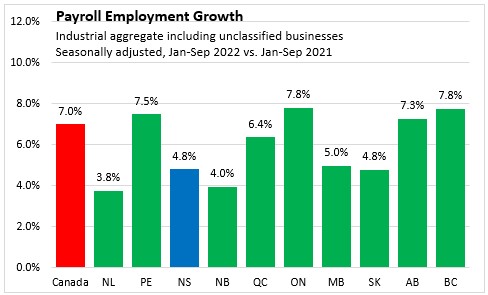
In January-September 2022, payroll employment was up 3.4% in Nova Scotia's goods producing sectors compared to the same period in 2021. Goods sector payroll employment was up in all sub-sectors except forestry/logging, with construction (+6.2%) recording the largest gain.
Service sector employment was up 4.6% in January-September 2022 compared to January-September 2021. Service sector payroll employment increased the most in percentage terms in accommodation and food services and arts, entertainment and recreation. Payroll employment decreased in management of companies.
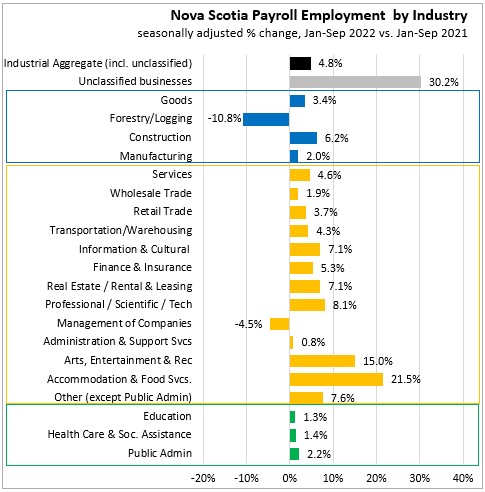
Average weekly earnings
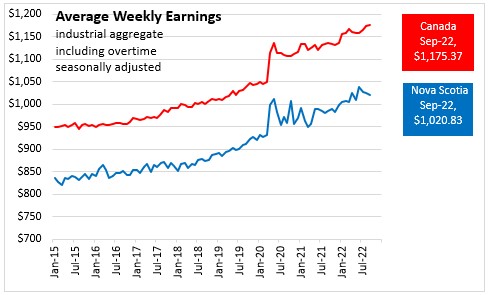
Nova Scotians' average weekly earnings (including overtime, seasonally adjusted) decreased 0.3% to $1,020.83 in September 2022. Average weekly wages were up 3.6% compared to September 2021. Canadians' average weekly wages increased 0.2% to $1,175.37 in September 2022 and were 3.5% above wages a year ago.

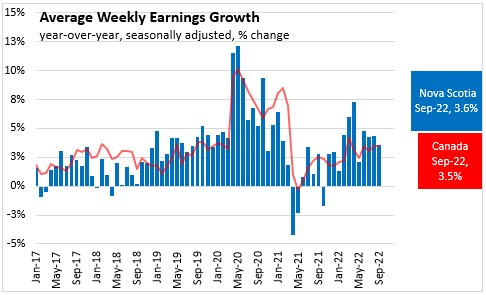
Across the country, there were monthly increases in six provinces, with the largest increases in Saskatchewan (+1.1%) and Newfoundland and Labrador (+1.0%). The largest decline was observed in New Brunswick (-17.0%), reversing an unusual 21.8% increase reported from July to August.
Compared to a year ago, average wages were higher in all provinces, with New Brunswick (+6.3%) recording the largest gain. The smallest gains were observed in Prince Edward Island (+2.4%) and Alberta (+2.6%).
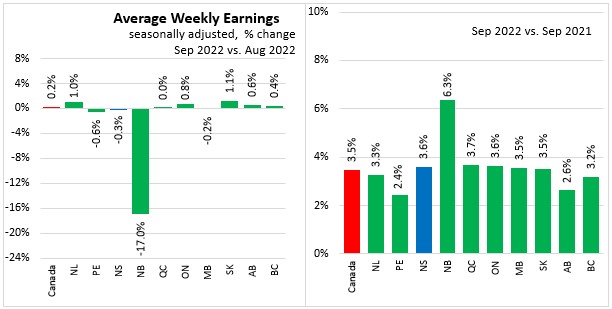
YEAR-TO-DATE (Jan-Sep 2022 vs. Jan-Sep 2021)
Compared to January-September 2021, Nova Scotia's average wages were up 4.2% in January-September 2022. Nationally, average wages were up 3.0% in the first nine months of the year. Average wages were higher in all provinces, with the largest increase in percentage terms reported in New Brunswick (+8.3%) including the August anomaly. The smallest gains were observed in Alberta (+2.3%) and Ontario (+2.4%).
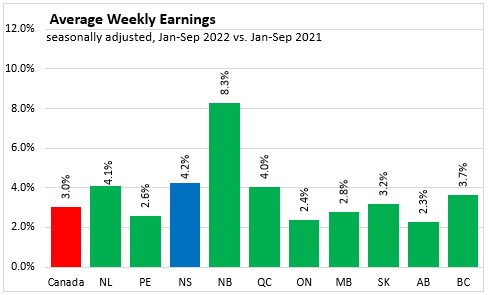
In January-September 2022, average weekly earnings were up 3.0% in Nova Scotia's goods producing sectors over January-September 2021. Goods sector wages were up for construction and manufacturing sectors. Service sector average earnings were up 4.4% in January-September 2022. Service sector earnings increased the most in percentage terms in information and cultural industries (+10.0%), professional, scientific and technical services (+9.9%), and retail trade (+9.1%). Service sector earnings decreased the most in wholesale trade (-2.4%).
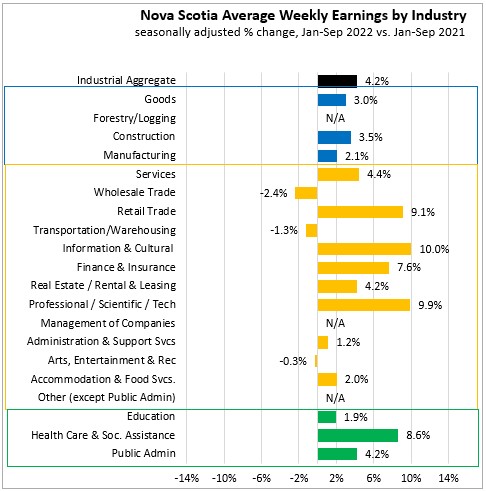
REFERENCE TABLES - (January-September 2022 vs. January-September 2021)
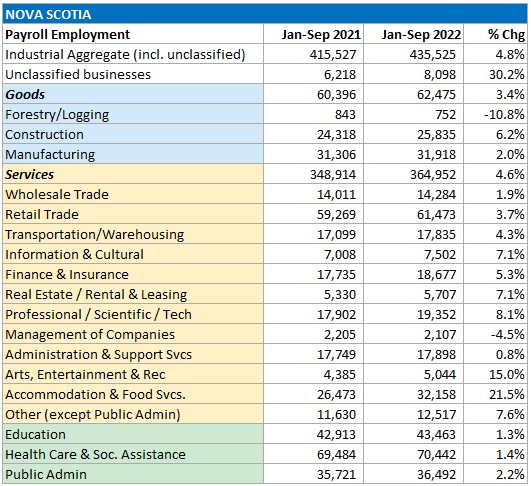


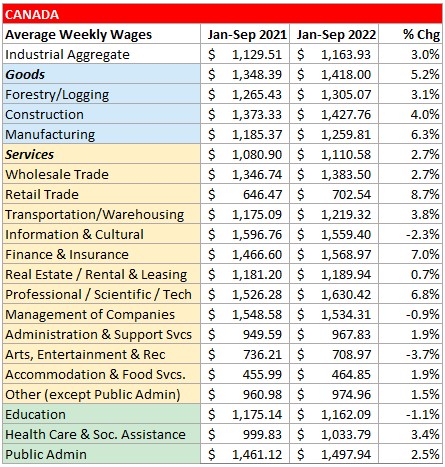
Source: Statistics Canada. Table 14-10-0222-01 Employment, average hourly and weekly earnings (including overtime), and average weekly hours for the industrial aggregate excluding unclassified businesses, monthly, seasonally adjusted; Table 14-10-0223-01 Employment and average weekly earnings (including overtime) for all employees by province and territory, monthly, seasonally adjusted
<--- Return to Archive